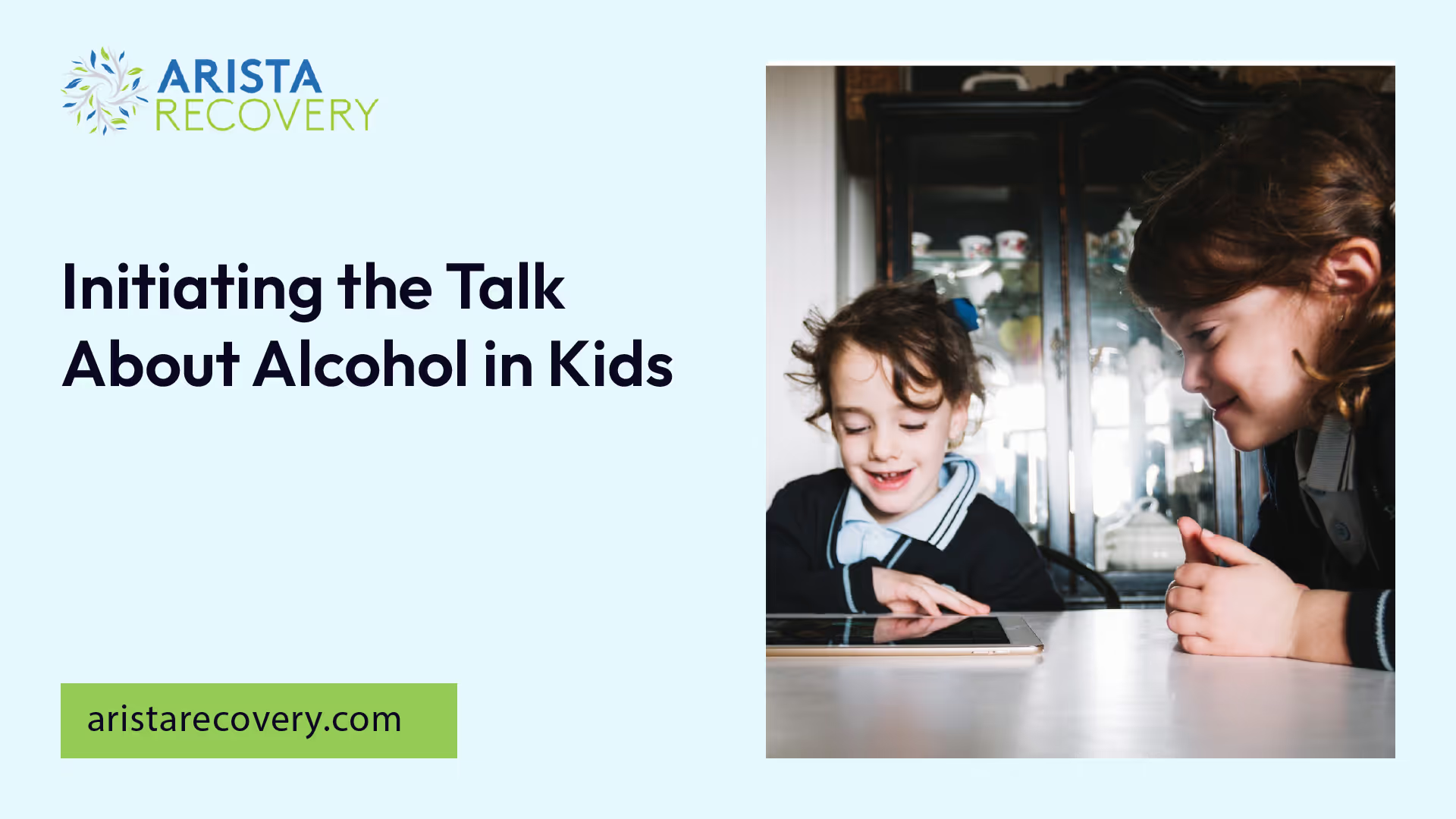Initiating the Talk About Alcohol in Kids

Understanding Underage Drinking
Understanding the dynamics of underage drinking is essential for parents and guardians. It involves recognizing early exposure to alcohol and the associated risks of starting young.
Early Exposure to Alcohol
Research indicates that a significant number of children in the U.S. have tried alcohol by a young age. According to a study by the Journal of Adolescent Health, 37 percent of all children have experimented with alcohol by age 8, which increases to 66 percent by age 12. These statistics suggest that delaying discussions about alcohol until children are approaching their teenage years may be too late.

As children grow older, particularly between the ages of 8 to 11, their attitudes towards alcohol can begin to change, often influenced by external factors such as friends, family, and media. This age range presents a crucial opportunity for parents to shape their child's perspective on alcohol [1].
Age GroupPercentage Trying AlcoholAge 837%Age 1266%
Risks of Starting Young
Starting to drink at an early age can have serious implications for a child's future. Evidence shows that children who begin consuming alcohol before the age of 15 are at a greater risk of developing alcohol-related problems later in life. Educating children about the risks associated with alcohol consumption is crucial. It should be emphasized that consuming alcohol under the age of 21 is illegal, regardless of the context.
Additionally, children as young as nine start to view alcohol positively. The early introduction to alcohol can also correlate with experimentation with other substances. Approximately 3,300 kids aged 12 try marijuana each day, and many children in this age group acquire prescription pain relievers for nonmedical purposes [2].
This information underlines the importance of proactive discussions. Engaging in alcohol education for kids and including age-appropriate alcohol discussions can be vital for healthy development.
Parental Influence on Adolescent Drinking
Importance of Parental Guidance
Parents play a crucial role in shaping their children's attitudes toward alcohol. Research indicates that around the age of 8 to 11, children's perspectives on alcohol begin to shift due to influences from friends, family, and their environment. This age range is a pivotal opportunity for parents to guide their children's views and behaviors regarding alcohol consumption [1].
Parental guidance helps establish a foundation for healthy decision-making. Studies show that adolescents raised in environments with warmth, encouragement, and appropriate discipline are more likely to respect their parents' boundaries on alcohol use, which in turn promotes responsible behavior [3].
Age GroupKey Influence8-11 yearsInitial attitudes toward alcohol changeTeensIncreased risk but also parental influence critical for decision-making
Role of Communication
Open and ongoing communication about alcohol is vital for effective parenting. Engaging children in discussions regarding alcohol helps them understand the potential risks and consequences associated with its use. Regular conversations allow parents to address their children’s concerns and ask questions, fostering a safe environment for dialogue.
Establishing a habit of discussing alcohol early and often encourages children to feel comfortable bringing up issues related to alcohol as they arise. This proactive approach can help prevent engagement in risky behaviors. Parents should aim to communicate not only the dangers of alcohol but also the values and expectations they hold regarding its use.
Statistics reveal that children who have early and frequent discussions with their parents about alcohol are less likely to partake in underage drinking. Parents who effectively communicate their values can also play a significant role in forming their children's attitudes towards alcohol. For more resources on how to approach these conversations, refer to our guide on addressing alcohol with children and alcohol education for kids.
Overall, the combination of parental guidance and open communication forms a strong support system that can greatly influence a child's choices regarding alcohol.
Strategies for Effective Parenting
Discussing alcohol with children can be a challenging yet vital part of parenting. Implementing effective strategies can foster open communication and help mitigate the risks of underage drinking.
Talking Early and Often
Research shows that around the ages of 8 to 11, children's attitudes toward alcohol can begin to shift due to external influences like interactions with peers and family. This age range represents a critical window for parents to significantly impact their child's perspective on alcohol [1]. Engaging in conversations about alcohol early and consistently helps in establishing a foundation of trust and understanding.
Parents should approach these discussions by focusing on age-appropriate alcohol discussions. Open dialogue enables children to ask questions and express their thoughts, making it easier for parents to convey important messages.
Age RangeDiscussion Focus8-11 yearsUnderstanding alcohol's effects and peer pressure12-14 yearsEmotional and social reasons to drink or not to drink15+ yearsPreparing for situations involving alcohol and decision-making
Establishing Clear Policies
Setting clear policies regarding alcohol is crucial. Adolescents are more likely to respect parental boundaries when they know specific guidelines exist. Research indicates that teenagers believe their parents should influence their choices regarding alcohol consumption [3]. Parents should clearly outline expectations and consequences, helping children understand the rationale behind the rules.
Additionally, modeling responsible alcohol consumption can reinforce these policies. When children see their parents behave responsibly regarding alcohol, they are less likely to engage in heavy drinking themselves [3].
Consistent Enforcement
Consistent enforcement of established rules is paramount to effective parenting concerning alcohol. Adolescents who understand that their parents would be disappointed if they drank are less inclined to drink. This consistent communication helps reassure children that their parents care about their wellbeing and encourages healthy decisions.
Children also benefit psychologically from knowing that their parents are dedicated to their safety, which can influence positive behavior regarding alcohol use. Regular discussions and a united front among caregivers enhance these protective measures.
For more resources on alcohol education for kids and addressing alcohol with children, parents can explore additional information to better equip themselves for these essential conversations.
Impact of Parenting Styles
The approach parents take in guiding their children significantly impacts how effectively they communicate about alcohol use. Different parenting styles have varying effects on kids' behavior in relation to drinking.
Authoritative Parenting Approach
Authoritative parenting is characterized by a balanced approach combining emotional support with clear boundaries. Research indicates that adolescents with authoritative parents are more likely to respect established limits regarding alcohol use. Approximately 80% of teens believe that parents should influence their choices about drinking [3].
Authoritative parents foster environments where open communication is encouraged. This style empowers children to discuss their feelings openly and understand the risks associated with alcohol. The combination of guidance and independence helps children feel secure while navigating challenging situations.
Permissive, Authoritarian, Neglectful Styles
In contrast, other parenting styles—permissive, authoritarian, and neglectful—can hinder effective communication about alcohol.
Adolescents exposed to these parenting styles are generally less influenced by their parents' guidance on drinking behaviors. Regardless of the style used, when children know their parents would be upset if they drank, they are less likely to experiment with alcohol. This highlights the critical nature of effective communication in addressing the topic of alcohol with children.
In summary, the parenting approach adopted significantly influences children's understanding and behavior regarding alcohol. Creating a supportive yet structured environment can promote healthier decision-making and open dialogue about alcohol use. Parents are encouraged to engage in alcohol education for kids to reinforce these discussions.
Community Engagement
Community involvement plays a crucial role in addressing the issue of underage drinking. Parents working together can create a supportive environment that encourages healthy alcohol-related discussions and fosters responsible choices among their children.
Working with Other Parents
Collaboration among parents can significantly impact their children's attitudes toward alcohol. Networking with other parents allows for shared experiences, strategies, and support systems that promote consistent messages about alcohol use.
Research highlights that when parents are unified in their approach to alcohol education, children are more likely to respect boundaries. Adolescents who recognize that their parents are collectively opposed to underage drinking are less inclined to engage in such behaviors. This collective stance on alcohol can help establish clear expectations and reinforce the importance of responsible behavior.
Key strategies for working with other parents include:
By maintaining consistent standards within the community, parents are better equipped to support each other and guide their children.
Promoting Dialogue in the Community
Encouraging open conversations about alcohol within the community is vital for fostering awareness and understanding. Engaging in public discussions allows for the sharing of experiences and critical information regarding the effects of underage drinking. Communities that prioritize dialogue create a culture where discussing alcohol is normalized, and resources are readily available.
Adolescents who perceive that their peers are also aware of their parents' disapproval of drinking are less likely to consume alcohol. Facilitating community conversations can involve:
By developing a united front within the community, parents and stakeholders can create a supportive environment that promotes responsible behavior and reinforces the messages shared at home. This community engagement helps foster a foundation where children feel safe discussing their concerns about alcohol and making informed choices. For more tips on addressing alcohol concerns, see our resource on addressing alcohol with children.
Consequences of Underage Drinking
Underage drinking carries significant risks that can affect a child's academic performance and overall health. The implications of initiating alcohol use at a young age are profound and far-reaching.
Academic Challenges
Engaging in alcohol consumption during adolescence is closely associated with various academic difficulties. Research indicates that teenagers who drink are more likely to experience problems related to schoolwork and behavior in class. Specifically, those who admit to binge drinking are 4 to 6 times more likely to skip classes compared to their non-drinking peers. High school students who drink regularly are also 5 times more likely to dropout of school.
The following table illustrates the correlation between alcohol use and academic performance:
BehaviorLikelihood of ConsequenceBinge Drinking4-6 times more likely to skip classesRegular Drinking5 times more likely to drop out of high schoolProblem Drinking in CollegeRelated to 40% of academic problemsEarly School Dropouts Citing Drinking Issues28%
For those who start drinking early, academic challenges compound over time, leading to long-term effects in higher education. Drinking is responsible for 40% of academic problems in college, highlighting the importance of talking to kids about alcohol and establishing preventive measures.
Health and Safety Risks
The health and safety risks associated with underage drinking are alarming. Early exposure to alcohol increases the likelihood of engaging in risky behaviors, such as early sexual activity and unprotected sex. These risks extend to the potential for becoming victims of violent crimes, including rape and robbery.
Statistics on the safety implications are notable:
Furthermore, research shows that individuals who commence drinking before the age of 15 are over 5 times more likely to develop Alcohol Use Disorder (AUD) later in life. This risk amplifies in those with a family history of addiction [5].
By understanding these consequences, parents and guardians can be better equipped to engage in meaningful alcohol education for kids and initiate impactful conversations about safe and healthy choices. Addressing these topics early can foster an open dialogue and create a supportive environment for children and adolescents. For more guidance, explore resources on addressing alcohol with children and age-appropriate alcohol discussions.
References
[2]:
[3]:
[4]:
[5]:
You’re not alone in this.
When mental health challenges and addiction intersect, it can feel isolating. At Arista, we offer compassionate, evidence-based, and trauma-informed care to help you heal, grow, and move forward.
You’re not alone in this.
When mental health challenges and addiction intersect, it can feel isolating. At Arista, we offer compassionate, evidence-based, and trauma-informed care to help you heal, grow, and move forward.
Support that moves with you.
You’ve taken a brave first step. At Arista Recovery, we’re here to help you continue with best-in-class care designed for long-term healing and support.
.webp)






